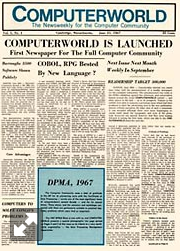Once upon a time I enjoyed a wonderful job as a Business Systems Analyst, working in a distribution center to make changes to our Enterprise Resource Planning system (ERP) in order to optimize the operation one step at a time. Basically I would translate business needs into functional requirements that our programmers could meet, and over time our team achieved some truly terrific things.
After a year or so, however, a downturn in business led to staff cuts, particularly on the IT side, and I was asked to pick up some programming responsibilities in addition to my analytical ones, since I had done some maintenance on ERP software in a previous job.
Now at this time I was in my early 30’s, keeping an eye out for opportunities to advance my career, so taking on additional work wasn’t necessarily a bad thing. Adding a technology on the rise (like Java was at the time) to my resume could be a real bonus, right?
ERP Software: Modern Systems, Ancient Technology
Instead, however, I was being asked to learn RPG. No, I’m not talking about Dungeons & Dragons (I was already expert in that, thanks), but rather Report Program Generator, an ancient computer language that traces its roots to the punch card era, but is still commonly used on the IBM AS400 (now known as the iSeries). RPG makes COBOL look flashy, if that helps to paint the picture for you; but since it works reliably for large-scale, repeatable processes, RPG and other older technologies are behind the scenes of many ERP systems, in this case BPCS.
As a young up-and-comer, however, I wasn’t exactly thrilled with this prospect. It felt more like an exercise in programming archaeology than a chance to move forward.
 Oddly enough a few days later, the 35th anniversary edition of ComputerWorld magazine arrived on my desk, a trade publication for corporate IT folks. In honor of their anniversary they reprinted the cover story from that first issue back in the 1960’s (as seen at right).
Oddly enough a few days later, the 35th anniversary edition of ComputerWorld magazine arrived on my desk, a trade publication for corporate IT folks. In honor of their anniversary they reprinted the cover story from that first issue back in the 1960’s (as seen at right).
To my horror the headline read: “COBOL, RPG Bested By New Language?”
Yup, even back in the 1960’s RPG was considered long in the tooth, and here I was decades later being asked to pick it up as a “new” skill.
My heart sank.
There’s No School Like the Old School
But you know what? Learning RPG turned out to be a pivotal point in my career. I only did real programming and maintenance in RPG for a year or two, but it led to a deeper understanding of the technical foundation of many ERP systems such as Infor M3, which was originally created under the name “Movex” and written in RPG.
Yes, I know that M3 has all the bells and whistles of a modern Java-based application, including an enterprise cloud-based hosting option and a configurable user interface, but the guts still bear the hallmarks of RPG, particularly with how data tables are named, structured, and accessed in various parts of the system. That architectural foundation is still there because it works well, and will continue to do so for a long time to come. Thankfully, having that old-school technical background helps today in my ERP consulting when I need to design reports or user interfaces.
With tech we’re always trying to keep on top of the latest developments, but we shouldn’t forget that the vast majority of the business world sees a fair amount of risk in the “hot new thing”. When it comes to the core logic running mission-critical operations, proven reliability is worth holding onto.
[bctt tweet=”Even in the fast-moving world of technology, it’s worth studying the classics.”]

Leave a Reply